German Students Enjoy Internships in Russia
From 30th March to 3rd April, 50 German students attended a session of the Business in Russia programme, run jointly by HSE and DAAD and the German Chamber of Foreign Trade since 2012. Students on the programme do six-month internships in German company offices in Russia and prepare group projects on various themes, under the guidance of HSE professor Natalya Guseva.
The seminar on the 30th and 31st March was for the third wave of students at the end of their internship in Russia to share their experiences and the seminar on the 1st-3rd of April was for a new group to give them an introductory course to help get ready for work in companies.
The HSE course is a unique combination of theoretical training with project work intended to develop the practical skills and competencies required to manage international companies working in Russia. The programme is also an excellent opportunity for personal growth and development as students spend half a year in a country which is new to them and immerse themselves in a foreign culture. Particular attention is drawn to cross-cultural aspects and the peculiarities of doing business in Russia. Participants analyse the similarities and differences in management styles in the two countries, study the ways bosses choose to motivate colleagues and compare methods of decision making.
Professor Natalya Guseva is convinced that familiarity with cultural subtleties is extremely important for future managers, as ‘culture may not be a source of conflict, as often happens, but rather a basis for a company’s extra competitive edge - when a manager knows how to use it to achieve synergy. It is very important to understand that there are lots of cultural stereotypes which prevent companies from working effectively. Immersing themselves in another culture helps managers to avoid stereotypes and be more successful.’
DAAD’s representative in Russia Dr Gregor Berghorn says, ‘The programme is intended to find and train young specialists who will work in German companies in Russia and maybe Russian industry in the future. Russia and Germany have a long history of partnership and we need qualified people to develop our work together. The companies themselves pick the interns. DAAD provides the funding and HSE gives students university support while they are working on projects. Students learn about day-to-day life and gather experience of what business in Russia is like, what is important, what has to be observed, and what may be different to what they know from Germany. And the companies and the students are both very happy with the results. In each wave several students get offered jobs to start as soon as they finish their internship. Germany and DAAD don’t offer such a programme anywhere but in Russia.’
Since 2014 two groups of students have been sent to Russia on the programme every year. It is a popular programme with both students and the companies. Many companies are offering more internships and sometimes there are up to 9 people competing for each place. The placements are not restricted to Moscow - students go to Kaluga, St Petersburg, Voronezh, Krasnodar.
During the internships, students develop theoretical concepts but they also conduct quantitative and qualitative research in companies through surveys and in-depth interviews with employees and management. Professor Natalia Guseva says that this is a unique opportunity for the students to learn about the specific nature of managing an international company in Russia and acquire valuable managerial know-how.
The programme is open to German undergraduates and Master’s students, as well as to recent graduates. Foreign students studying in German universities can also apply. Applications for next winter (2015-2016) should be made between 17th April and 31st May and for the summer semester in 2016, between 4th October and 30th November on the DAAD website at the webpage. There are more details about the selection process on the DAAD website.
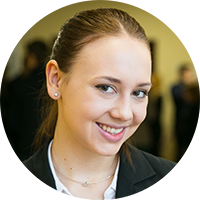
Katharina Obinger, 3rd group
My internship was at Siemens – I was with the project management team. I think I’ve changed a lot and learnt a lot. It was particularly interesting for me to learn intercultural differences because I am also studying psychology in management but it was important to spot the similarities between the two cultures too. It was cool how I adapted to the situation. I would love to work with Russian companies in the future. I really love the culture here, the people. When I visited Kaluga I got to see a completely different Russia. It’s wrong to assume that if you know Moscow, you know Russia.
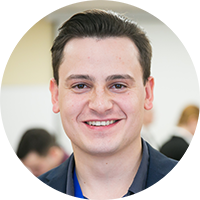
Victor Wolf, 3rd group
I have very positive impressions. A huge thank you to everyone who made the programme happen. My expectations were completely different from what I actually found but I’m very happy that it turned out that way. My standards were too German, and my thinking too German. In fact, when you work in a collective here, you’re not an intern but a responsible member of the team.
I was in a Volkswagen factory in Kaluga. I was supporting foreign employees. Most of them were from Germany of course as it’s a German company, but there were colleagues from Mexico and the Czech Republic too. My job was to help the foreign students who needed help - to go to the tax office, translate or show them how bureaucracy works in Russia because it isn’t the same as in Germany. My aim was to carry on the internship to compare how Volkswagen works in Germany. And I’ve pulled it off - in May I’m going to Wolfsburg to continue my internship and write my dissertation. I want to work in a German company which has contacts with Eastern Europe, Russian and the CIS.
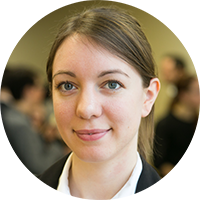
Anna Hautmann, 3rd group
My internship was with Siemens. I really enjoyed being a member of a team, who are not all Germans, like I am, but an international team, including both Germans and Russians. Now I know I can live in Russia and not feel foreign. I think the experience I got here will help me in life regardless of whether I will live in Russia again or not. Personally, I can say that I gained a lot of experience, but I also grew up. I think all nationalities can learn from each other. I was surprised by the complexity of Russian culture. For example, I lived here in Moscow, in a very big city, and everybody looks European, and you think you are the same, but you are different if you go deeper in the culture. The Russians are, and it was quite surprising to me, at first, not that open, but if you get to know each other, you can always refer to them with a question, and they are so helpful, even more than I had expected.
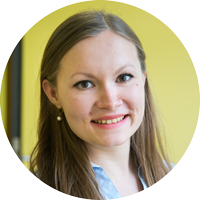
Kristina Arisova, 3rd group
I was an intern at the Russian German Chamber of Commerce and our project was to develop a dual education programme. It was interesting as we were working on something new. I met lots of representatives of foreign companies in Moscow and I think it will help my career. I gained loads of experience of talking to people from different cultures and I’d like to use that experience to work in Russian-German relations in the future, maybe in the German Chamber of Foreign Trade.
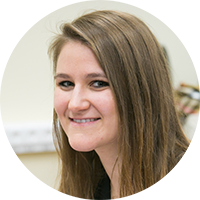
Vanessa Reger, 4th group
I applied for the programme because I’ve been studying Russian for some time and I wanted to start using it. I am excited to have an opportunity to become better acquainted with Russian culture. I’m curious to learn more about doing business in Russia. I’ve been to Russia previously, so I know that’s it’s an exciting country.
Prepared by Maria Besova, HSE English language website
See also:
'We Are Interested in Creating Opportunities for Those Who Are Genuinely Passionate about the Russian Language and Culture'
This year marks the 10th anniversary of HSE University's International Prep Year Programme. Over the past 10 years, approximately 2,000 international students have taken courses offered through the programme. At the core of their educational experience is the study of the Russian language, combined with subjects related to their future specialties, such as mathematics, computer science, literature, and history. In addition, students take part in interactive events organised by the programme. Vice Rector Victoria Panova discusses the origins and development of the HSE International Prep Year, as well as its main purpose.
‘HSE Stands Out for Its Academic Reputation, International Environment, and Approach to Learning’
This year marks the 10th anniversary of the HSE International Preparatory Year programme. The programme offers a one-year foundation course for international applicants preparing to enter Russian universities. HSE lecturers help future students acquire the knowledge and skills needed to successfully undertake a degree programme in Russia.
‘This Internship is a Great Start to an Academic Career’
This year, Angelina Yudina graduated from the Bachelor’s in Business Informatics at HSE University and enrolled in the Master’s in Economics and Economic Policy. She has also worked as a research assistant at the International Centre of Decision Choice and Analysis since May 2021. In her interview, Angelina spoke about her role and responsibilities as a research intern, the personal and professional skills she has developed, and her plans for the future.
‘The Admissions Process Was Fairly Simple’
In 2022/23, HSE University will be offering 45 English-taught master’s programmes in a variety of fields ranging from maths and economics to social sciences and humanities. International admissions are open until August 15, 2022 but early-bird applications will be eligible for full-tuition scholarships. Several first-year master’s students have shared their experiences of getting into the university and starting their studies.
‘In the Future, I Would Like to Become an HSE University Teacher’
Karina Kuzhanova, third-year student at the Faculty of Law, and Anna Yatsenko, second-year student at the Faculty of Economic Sciences, moved to Moscow from Kazakhstan to study at HSE University. They shared their impressions of studies and student life with the HSE News Service, as well as talking about some of the most inspirational things in the Russian capital.
Student Internship Programme at the
In April 2020, the Institute for Applied Political Studies (IAPS) launched an internship programme. Programme interns work together with Institute staff on joint projects, as well as acquire new research and communication skills. 40 students are currently participating in the programme
New HSE Master’s Programme Focuses on German-Speaking Countries
The Faculty of Humanities is now accepting applications to its new Master’s programme, ‘Germanica: History and Modernity’ for the fall of 2020. The programme gives students a wide-ranging knowledge of the German-speaking regions of the world—Germany, Austria, and Switzerland. The programme is taught in Russian and German. Applicants’ proficiency of German will be verified upon admission. Professor Petr Rezvykh, the programme’s Academic Supervisor, discusses the features of the programme.
SCO Headquarters and Peking Duck: HSE Lyceum Students’ Internship in China
This summer, students of Asian Studies at HSE Lyceum spent a month in China. They studied at Liaoning Normal University, visited ancient temples, and met the Shanghai Cooperation Organization (SCO) Secretary-General. The students spoke to HSE News Service about their trip.
HSE and the Ruhr-University Bochum Sign Cooperation Agreement
The agreement establishes a student- and academic-exchange programme and the opportunity for joint educational and research project development. The agreement was signed on April 8 with the participation of representatives of the government of North Rhine-Westphalia.
Internship at HSE Centre for Psychological Counseling Kickstarts Careers
The HSE Centre for Psychological Counseling has been offering internships for master’s students in psychology for five years. Students from HSE, as well as from other universities, can get an internship. Here’s more information on how the programme works and the opportunities it offers.


